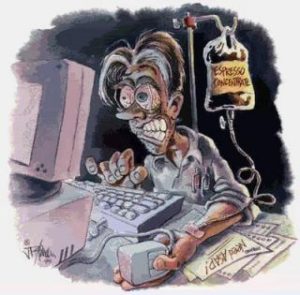I must admit, I distrust “the web,” and the seemingly non-ending encroachment upon one’s life by social media.  When I read Kenneth Goldsmith’s article, “Wasting Time on the Internet? Not Really,” I was in no mood for an argument that offers praise for the role of the Internet in contemporary life. However, to be fair, Goldsmith’s accolades are less for the Internet itself, and more for what can be accomplished with it.
When I read Kenneth Goldsmith’s article, “Wasting Time on the Internet? Not Really,” I was in no mood for an argument that offers praise for the role of the Internet in contemporary life. However, to be fair, Goldsmith’s accolades are less for the Internet itself, and more for what can be accomplished with it.
For Goldsmith, this theory is predicated upon personal social, albeit non-clinical, experimentation. He taught a class at the University of Pennsylvania wherein he enjoined the students to “… prob[e] the tedium of the internet” together. This behaviour led to a creative conjoining of ideas, mediums, and expression in the form of trust experiments, inquiries into the modern nature of the self and the crowd, and improvised dance.
What is more, as professor, Goldsmith married the cornucopia of information gleaned from the “net” with the historical preconditions for said material. He plaited Internet surfing and data with theories such as Cubism and Surrealism to create continuity with earlier, great thinking.
This is not behaviour I disapprove of. This is an instructor using modern technology to gain, and maintain, the interest of his students. It is also a means of making history personal and relatable for a younger generation who might otherwise be impenetrable to these ideas and thinkers. In a moment of personal honesty, I realized that I write, study, and complete academic work with the aid of the Internet. I use Youtube to locate music for inspiration, relaxation, and rebalancing during stressful situations. I also use Netflix as an escape from the monotony of life.
 Yet, I am still a fully functioning individual. My lack of sleep or caffeine has a more dire impact upon my ability to be sociable than does the amount of time I spent surfing the web. Such time often leads me to moments of intense insight, identifies calls to action that I want to answer, and presents possible solutions to myriad problems.
Yet, I am still a fully functioning individual. My lack of sleep or caffeine has a more dire impact upon my ability to be sociable than does the amount of time I spent surfing the web. Such time often leads me to moments of intense insight, identifies calls to action that I want to answer, and presents possible solutions to myriad problems.
Goldsmith asks the question, “What will an educated person be in the future?” I realize that, like it or not, technology isn’t going anywhere. Whether I feel it has become a permanent and rude intrusion into our personal lives, is often misused as a means of deliberate disconnect from society, or is the antithesis of all things related to personal conversation and personable interaction, the Internet is also the modern gatekeeper of knowledge. They who would be educated must know how to navigate the Internet; or, as Goldsmith argues, “… an educated person in the future will be a curious person who collects better artifacts.”
There is no disputing this truth. I can vouch for its validity by recollecting the ease, or difficulty, of past academic assignments based upon my efficiency of searching for appropriate and applicable information.  It would appear then, that the Internet is not just a means of creating a brain-dead society. It is also the medium that is creating a differently wired brain in society.
It would appear then, that the Internet is not just a means of creating a brain-dead society. It is also the medium that is creating a differently wired brain in society.
I am “old school;” I prefer hard copy to electronic formats. But I am an advocate for learning— in any form. Per Goldsmith’s article, “the ability to call up and use facts is the new education.” Therefore, by my own admission, I must learn to work with this new medium; or, at the very least, respect the efforts of those who can, and do.
Discover more from UCWbLing
Subscribe to get the latest posts sent to your email.

